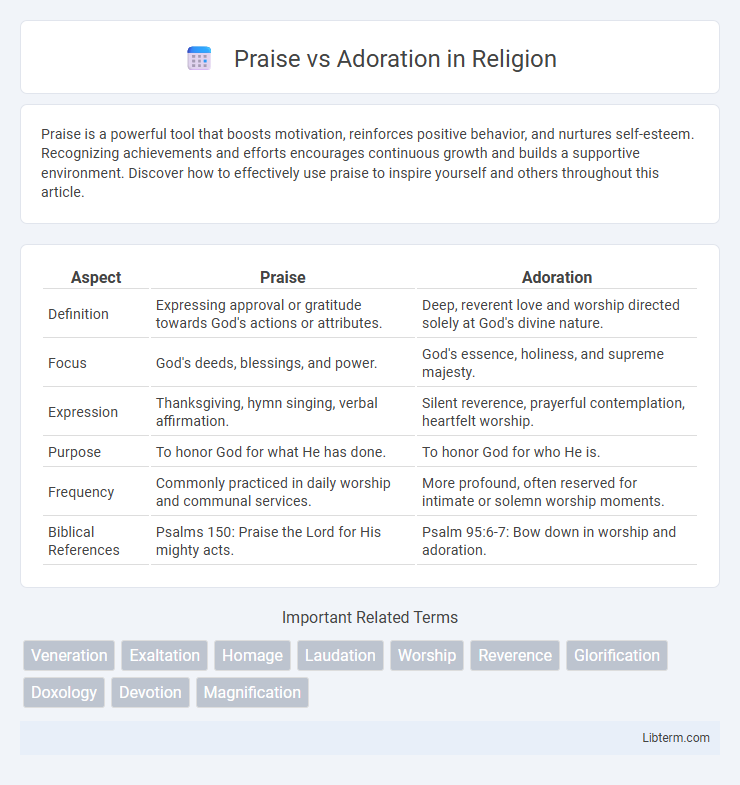Praise is a powerful tool that boosts motivation, reinforces positive behavior, and nurtures self-esteem. Recognizing achievements and efforts encourages continuous growth and builds a supportive environment. Discover how to effectively use praise to inspire yourself and others throughout this article.
Table of Comparison
| Aspect | Praise | Adoration |
|---|---|---|
| Definition | Expressing approval or gratitude towards God's actions or attributes. | Deep, reverent love and worship directed solely at God's divine nature. |
| Focus | God's deeds, blessings, and power. | God's essence, holiness, and supreme majesty. |
| Expression | Thanksgiving, hymn singing, verbal affirmation. | Silent reverence, prayerful contemplation, heartfelt worship. |
| Purpose | To honor God for what He has done. | To honor God for who He is. |
| Frequency | Commonly practiced in daily worship and communal services. | More profound, often reserved for intimate or solemn worship moments. |
| Biblical References | Psalms 150: Praise the Lord for His mighty acts. | Psalm 95:6-7: Bow down in worship and adoration. |
Understanding Praise and Adoration
Praise involves expressing approval or admiration typically for specific actions or qualities, often directed toward individuals or deities in recognition of their achievements or virtues. Adoration goes deeper, embodying profound love, reverence, and worship, especially within spiritual or religious contexts, emphasizing a heartfelt connection beyond mere acknowledgment. Understanding these distinctions highlights praise as an act of commendation, while adoration signifies an intense devotion and emotional bond.
Defining the Key Differences
Praise involves expressing approval or admiration for someone's achievements or qualities, often in a specific context or moment. Adoration goes deeper, reflecting a profound love and reverence that remains constant regardless of circumstances. The key difference lies in praise being situation-based and adoration being an enduring emotional devotion.
Historical Origins of Praise and Adoration
Praise and adoration both originate from ancient religious practices where humans expressed reverence to deities and supernatural beings. Historical records from Mesopotamian, Egyptian, and Greek civilizations show praise as vocal or musical expressions of approval and gratitude, while adoration involved deeper worshipful devotion often linked to rituals or sacrifices. Over time, praise evolved to encompass acts recognizing accomplishments or virtues, whereas adoration maintained a more solemn and reverent significance in spiritual contexts.
The Role of Emotion in Both Practices
Praise involves expressing approval or admiration, often linked to recognition of achievements or qualities, and typically evokes positive emotions like joy or gratitude. Adoration deepens this emotional experience by fostering reverence and profound love, often directed toward a deity or an ideal, intensifying feelings of awe and devotion. Both practices utilize emotional engagement to strengthen bonds, enhance motivation, and reinforce social or spiritual connections.
Praise in Religious and Secular Contexts
Praise in religious contexts often involves expressing reverence and gratitude toward a deity through prayers, hymns, and rituals, reinforcing faith and communal worship. In secular contexts, praise serves as recognition of achievements, efforts, or virtues, commonly used in education, workplaces, and social interactions to motivate and build self-esteem. Both contexts utilize praise as a powerful social tool to acknowledge value, foster connection, and encourage positive behavior.
Adoration: A Deeper Connection
Adoration signifies an intense, heartfelt reverence that transcends simple praise by fostering a profound emotional and spiritual bond with the subject, often seen in religious or intimate contexts. Unlike praise, which acknowledges achievements or qualities, adoration embodies unwavering devotion and a sense of sacredness. This deeper connection promotes a transformative experience, nurturing trust, love, and an enduring commitment beyond surface-level appreciation.
Benefits of Practicing Praise
Practicing praise fosters positive emotions and strengthens interpersonal relationships by recognizing others' achievements and qualities, which boosts self-esteem and motivation. Regularly expressing praise enhances mental well-being, reduces stress, and creates an uplifting environment conducive to personal and professional growth. This practice cultivates gratitude and encourages a supportive culture, promoting mutual respect and increased collaboration.
The Transformative Power of Adoration
Adoration, unlike praise, goes beyond acknowledging achievements by fostering a deep, reverential connection that transforms both the admirer and the admired. It cultivates a profound sense of humility and spiritual growth, enabling individuals to experience a lasting emotional and psychological shift. This transformative power of adoration elevates relationships by inspiring unconditional love and unwavering commitment.
Integrating Praise and Adoration in Daily Life
Integrating praise and adoration into daily life enhances spiritual well-being by fostering deeper gratitude and connection with the divine. Regular moments of praise acknowledge specific blessings and achievements, while adoration cultivates reverence for the divine presence beyond tangible outcomes. Combining both practices encourages a balanced, enriched spiritual routine that nurtures faith and mindfulness consistently.
Choosing Between Praise and Adoration
Choosing between praise and adoration depends on the depth of emotional connection and intent; praise often acknowledges specific achievements or qualities, highlighting appreciation for actions or attributes. Adoration conveys a profound reverence and unconditional love that transcends particular deeds, emphasizing a heartfelt devotion toward a person or deity. Understanding this distinction enhances communication by aligning expressions with the desired level of respect and affection.
Praise Infographic

 libterm.com
libterm.com